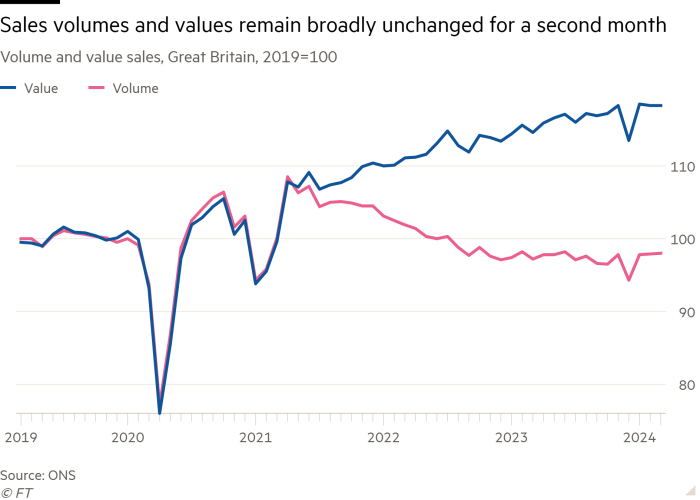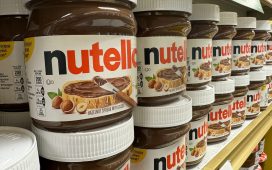Unlock the Editor’s Digest for free
Roula Khalaf, Editor of the FT, selects her favourite stories in this weekly newsletter.
British retail sales unexpectedly stagnated in March as a contraction in food and department store purchases offset growth at clothing stores and petrol stations.
The quantity of goods bought in Great Britain was unchanged between February and March following a revised 0.1 per cent increase in the previous month, the Office for National Statistics said on Friday.
The zero growth was lower than a 0.3 per cent expansion forecast by economists polled by Reuters, but still an improvement on the contraction recorded for most of last year.
ONS senior statistician Heather Bovill said “hardware stores, furniture shops, petrol stations and clothing stores all reported a rise in sales”.
“However, these gains were offset by falling food sales and in department stores where retailers say higher prices hit trading,” she added.

Overall sales across the three months to March were up 1.9 per cent, driven by the strong sales growth recorded in January. The figure for the first quarter was the fastest quarterly growth since 2021.
The quarterly sales expansion brings “the retail recession to an end”, said Alex Kerr, economist at Capital Economics.
“Despite the softer than expected data, retail sales still added almost 0.1 percentage points to real GDP growth in Q1,” he added, helping the economy recover from last year’s technical recession.
The figures will complicate the picture for Bank of England policymakers after separate data this week showed wage growth was still strong and inflation declined slightly less than expected in March — though still to a two-and-a-half-year low of 3.2 per cent.
The ONS reported that sales in food stores fell 0.7 per cent in March and were 3.9 per cent below their February 2020 levels, before the pandemic, reflecting how the burst of inflation in recent years has led to households trimming their grocery spend.
Non-store retailing, which includes online, contracted 1.5 per cent in March, while sales in department stores were down 3.8 per cent.
Sales in petrol stations were up 3.2 per cent in March, household goods stores reported a 2.4 per cent expansion and sales at clothing stores rose 0.5 per cent.
Many economists say rising real wages, falling inflation, cuts in national insurance and the increase in the living wage will all help household incomes and spending.
But Gizem Günday, partner at the consultancy McKinsey, cautioned that “household confidence about declining inflation does not seem to be feeding through to increased sales volumes at the tills just yet”.








